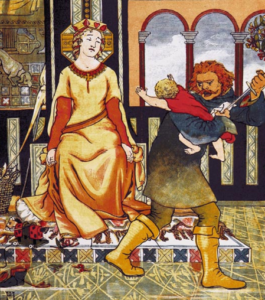[This post was written in the spring 2018 semester for Karrie Fuller's course on Chaucer’s Canterbury Tales. It responds to the prompt posted here.]
The question of how we deal with texts that are problematic yet revered is one that pervades modern readings of Chaucer’s Canterbury Tales. “The Clerk’s Tale” is no exception, as it depicts the unwavering devotion of Griselda to her husband King Walter, even when he cruelly takes her own children away from her. In one of the stranger literary moves in the Tales, the “Clerk’s Tale” includes an “Envoy” with some concluding remarks on the tale proper. This envoy offers a seemingly competing moral than the Clerk originally gave in his tale. How we read this envoy becomes a complicated task. For one, we are unable to say for certain who is its speaker. While many scholars believe these are still the words of the Clerk, others offer competing arguments that they are actually Chaucer’s. While finding out the intended speaker would likely change the meaning of the “Envoy,” we will read this section as most critics currently do: as an ironic passage[1].

At face value, the “Envoy” of the “Clerk’s Tale” rejects the moral that women should strive to the levels of obedience that Griselda achieves. The envoy says that this is impossible, and women should instead hold no silence and take governance into their own hands. However, the “Envoy” goes even further to direct women to wield metaphorical arrows and binding practices offensively against men. While these are metaphorical images, the point is that women should rise up and achieve unjust levels of domination over men. Read ironically, as most critics do, the speaker is in reality still advocating that Griselda’s obedience is the ideal and that female dominance is to be sidestepped. The irony highlights only two extreme possibilities for women: the selfless obedience of Griselda to her husband, and the forced dominance of a woman similar to the Wife of Bath. These two characters of the Canterbury Tales are often analyzed in opposition to one another because they are polar opposites. They represent the two ends of the spectrum, and how there is no apparent middle ground for women to inhabit. Here we find the problem of the “Envoy.” Whether or not it advocates for the obedience of Griselda, it acts as if there is only one other alternative for women, which is unjust dominance.
The “Envoy” of the “Clerk’s Tale” is not the only relevant text to display this misogynistic phenomenon. In pop culture today, the 2014 film Gone Girl has garnered attention from critics for similar reasons. The film depicts Amy Dunne, who basically fakes her own kidnapping and murder to frame her husband. In carrying out her carefully orchestrated plot, Amy lies and even kills to punish her husband.

As critic Veronika Kiss comments in a 2014 article, “she commits these reprehensible actions under the guise of being a feminist liberator, lending credence to misguided fears that all feminists are out to get men.” The “guise of being a feminist liberator” is an important concept because even though other critics saw Amy’s independence as a feminist action, we can more truly deduce that her violent actions against men have no place in the narrative of true feminism. Therefore, Amy represents the extreme end of the womanly spectrum, opposite to the “Clerk’s Tale’s” Griselda. Placing her at this extreme implicitly establishes an argument that there are only two possibilities for women: complacent, suburban Amy, or reckless, murderous, freed Amy. This phenomenon can be described as pseudo-feminist because it implies that the “liberated” woman must be an extremist one.
In a way, this idea confines women further because it denies them the possibilities of the spectrum, and places them into one of two categories. We can argue which category Chaucer or the Clerk thinks women should belong to, but that doesn’t take away from the fact that having only two categories is reductive in nature. However, recognizing this phenomenon in media, like the examples in the “Clerk’s Tale” and Gone Girl, is an important exercise in recognizing shortcomings in equality and formulating a more reasonable, modern feminist narrative.
Tess Kaiser
University of Notre Dame
[1] Cherniss, Michael D. “The ‘Clerk’s Tale’ and ‘Envoy,” the Wife of Bath’s Purgatory, and The ‘Merchant’s Tale.’” The Chaucer Review, vol. 6, no. 4, 1972, pp. 235–254. JSTOR, JSTOR, www.jstor.org/stable/25093203.
